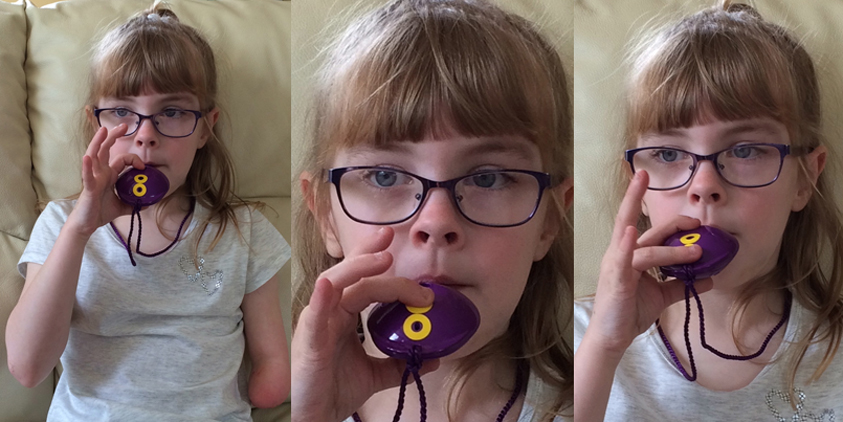Inclusive and Accessible Ocarinas
Robust, Responsive, Rewarding and Musical – Ocarinas are for ALL primary school pupils and their teachers…

The Oc® is the simplest of musical instruments and enjoys great success with all primary school pupils, including those with special educational needs and disabilities, SEND, or the use of just one hand. The reasons are numerous:
- 1 – a gentle breath produces a pleasing sound – from single notes to sophisticated tunes;
- 2 – only the two strongest fingers on each hand are used – the least dexterous can change the pitch of the notes and play musically;
- 3 – raised rims around the finger-holes guide the fingers and the holes are small enough to be easily covered completely, for accurate tuning of all the notes;
- 4 – Ocarinas are very attractive in colour and feel, they are safe and hygienic, chunky and robust;
- 5 – the ocarina ‘code’ involves pre-reading skills – opening understanding of pitch, rhythm and the ‘language of music’ to everyone including those who don’t yet read, or may never do so.
Teachers email us constantly with their delight and success stories in teaching children to play the Ocarina, including many examples of how autistic children and those with ADHD find Ocarina-playing calming. Here’s one snippet:
This is just to let you know that I finally introduced the Ocs to my teenagers on Tuesday. And they were a great success! You can’t imagine how much relief there is in that sentence. I bought the Ocs last August and started my new school in September. These are students who all have some sort of learning difficulty; dyslexia, ADHD etc. They are intelligent young people aged between 12 and 16 who have always struggled to achieve at school. There are only 8 pupils but it’s a challenging situation for a variety of reasons. Anyway, they all loved the Ocs. I wish I’d had a camera because the astonishing facility of playing a tune within 5 minutes of opening the book is priceless, especailly for students who struggle to achieve everything.
‘Can we have music again after lunch’ (from one who loves to display disgust for most things)
‘Can I go away and practise?’ (from one who avoids anything resembling hard work)
‘How do I know how long to hold the notes?’ (the route to introducing musical notation!)
I could go on but I’ll let you know what happens next! I have a lot of ideas…
Here is a comment about the Ocarina charts – from a disability coordinator who is a dyslexia expert:
The Oc-pix and Oc-box notation… relate directly to the physical movements. It is much more straightforward for someone with dyslexia to process, as there is not an abstract, theoretical concept behind it. Starting this way is a very good way of building musical confidence for all.
It is not unusual for teachers to return to school long after their retirement, to continue teaching Ocarinas throughout the school or just run a club:
Music-making is so important and children enjoy it so much – you should see my group play!! My infants love Ocarinas and the fact that nearly 30 of them still attend the club must be good. I have taught recorders so have experience of both and know how boring the first few weeks of recorder can be if you can’t reach the holes. I enjoy teaching the Ocarina so much I do it for nothing!! Just the joy of hearing the children finally get all the notes in the songs we have been learning is great.
Music for Every Child and Every Teacher has always been our motivation and underpins all that we do here at Ocarina Workshop – inclusivity stretches to everyone in school and beyond.
One-handed Ocarinas
And now children (and adults) with the use of only one hand can play along on the one-handed 4-hole Oc, following specially adapted Ocarina music.
Our friend AJ (pictured below) is in Year 2 and plays the one-handed Oc along with her classmates in whole-class Ocarina lessons. You can see the ease with which she can cover each of the four holes to play a full octave of notes. This 4-hole Oc has three finger holes on the top and one thumb-hole underneath. If you look carefully at our Introducing Ocarinas Video you will also see a child playing the one-handed Ocarina. For many years, teachers have been able to include children with the use of only one hand in Ocarina lessons – the specially adapted instrument and music mean that no differentiation is needed. AJ has chosen to add hole reinforcers to make the holes easier to feel (we can supply and fit these).

Here is the citation from Music Teacher Awards for Excellence:
The 4-hole Oc combines creative potential, ease of use, affordability and practicality…
We trust that you will find the Ocarina the most appropriate, inclusive and accessible instrument – for ALL your children.
